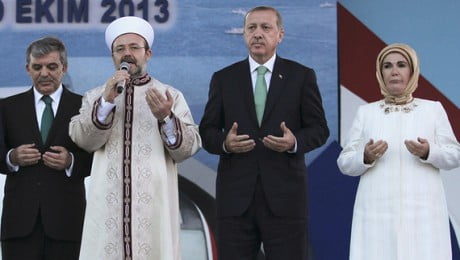Keyword: Turkey

Who speaks for Islam in Turkey?
Huseyin Gulerce voiced deep concern about Erdogan’s criticism of Fethullah Gulen “as a fake prophet” at a meeting of the Religious Affairs Directorate. Gulerce asked, “Would not the stability of the country be harmed if the mosques are polarized as such?” He concluded that politics have dominated religion.

Deviation, crisis and opportunities…
The recent crisis going on between the Justice and Development Party (AK Party) government and the Hizmet movement is indeed not just a struggle between the two actors. It means much more than that. This fight represents a struggle between democracy and autocracy, freedom and oppression and a harmonious society and a polarized society.

Extradition request for Gülen aims at manipulating public perception
The Journalists and Writers Foundation (GYV) — whose honorary chairman is Turkish Islamic scholar Fethullah Gülen — has stated that Prime Minister Recep Tayyip Erdoğan has been trying to create the perception that the Hizmet movement is being backed by the US with his recent request for Gülen’s extradition though there is no legal basis for one.

Ankara’s soft-power dilemma
Turkey’s major assets in terms of successful diplomacy and soft-power policy included Turkish schools opened by the Hizmet movement all around the world; the International Turkish Language Olympiads organized by the same group; business associations within and outside the borders of Turkey; intercultural and interfaith dialogue societies; foreign language publications of Turkish society; Turkish hospitals in several countries; and Turkish international humanitarian aid organizations.

Does Erdogan really want Gulen in Turkey?
General assumption is that Erdogan is indeed playing a cynical game with the Gulen issue, and also involving the United States in this, in a populist effort aimed at his own constituency in the lead-up to the presidential elections in August, where he is expected to run.

Court accepts indictment against 9 officers in case seen as political witch hunt
The investigation into the nine police officers is being carried out by Adana Deputy Chief Public Prosecutor Ali Doğan. The investigation drew strong criticism, as they were based on claims made in government media outlets’ news reports. This raised suspicions as to whether the Justice and Development Party (AK Party) had kicked off a witch hunt against the Hizmet movement, which the prime minister recently threatened to “punish with a large-scale operation.

No measures taken against ‘parallel structure’ at top security meeting: General Staff
The Turkish General Staff has dismissed reports that measures against the “parallel structure” – the government’s code word for the movement of erstwhile ally Fethullah Gülen – in the army have been taken during a National Security Council (MGK) meeting on April 30.

Is it a parallel triangle or square?
The content of a secret meeting on Syria was leaked to the media. This paper made a headline back then asking for accountability for the leak as well as the horrible plans discussed at that meeting. What did the prime minister do? Without offering evidence, he declared that the Hizmet movement was the culprit; a few days ago, he admitted that they were unable to identify the perpetrators. So, why did you declare the movement responsible for it?

Parallel vs. Persian structure within the Turkish state
Despite all these accusations, the Erdoğan government has not produced any evidence to substantiate his allegations of a parallel structure within the judiciary, police or any other state institution, nor of officials receiving orders from anywhere other than their own legal superiors, nor has he or his government brought any of these charges to court.

Academic freedom at universities under growing threat
Süleyman Yaşar, a former columnist at the Sabah daily who has a broad vision regarding the economic policy of the current government, was fired from the outlet for not criticizing the Hizmet movement [the faith-based organization inspired by Turkish Islamic scholar Fethullah Gülen]

‘Ankara no longer producing laws compatible with EU norms’
When it comes to how Europe sees Erdoğan’s claims and the demonization of the Gülen movement, European Commission officials clearly told Turkish officials, including Çavuşoğlu, that the AKP’s demonization of the Gülen movement seems like an effort by the ruling party to cover up the corruption investigation, because there is no other way to explain why prosecutors and police who have been investigating a major corruption [scandal] were removed.





















